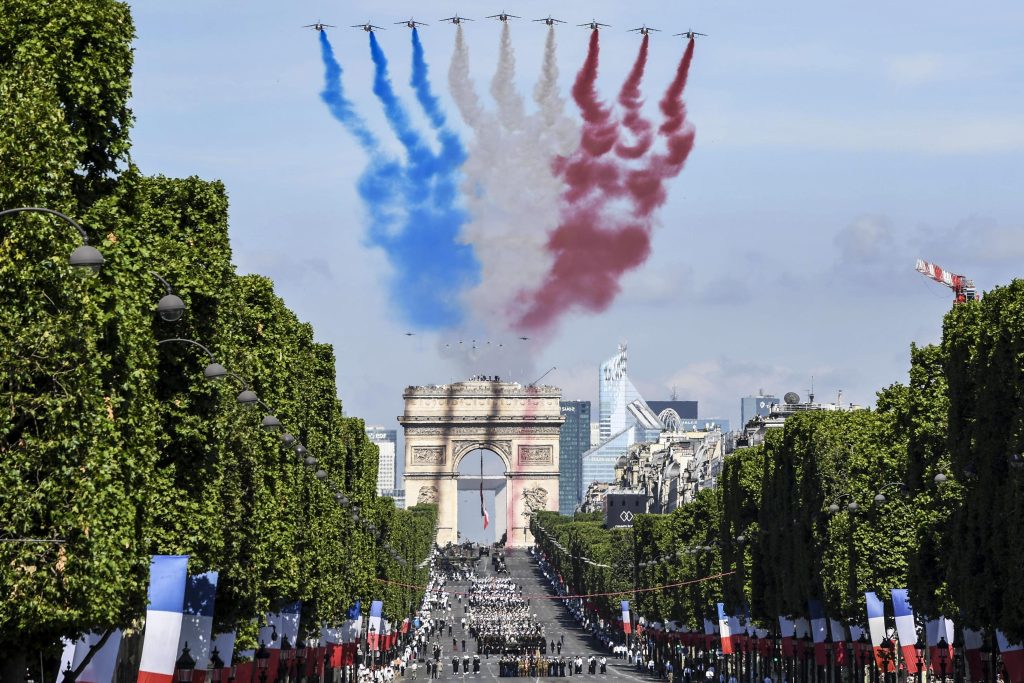In the swirl of blue, white, and red flags fluttering against a summer sky, France comes alive each year on July 14th for what the world often calls Bastille Day. Yet, in France, the day is formally known as La Fête Nationale or Le Quatorze Juillet, a subtle but telling difference that reflects the French relationship with their history and national identity.
The celebration marks a pivotal point in French history, yet its meaning today transcends a single event. It has become a mosaic of military tradition, communal festivities, reflective moments, and exuberant revelry, all converging to express the French values of liberté, égalité, fraternité — liberty, equality, and fraternity.
A Storming That Shook the World
To understand the soul of La Fête Nationale, we must journey back to 1789, to a France simmering with discontent. On July 14 that year, Parisians stormed the Bastille, a medieval fortress and prison in Paris, seen as a symbol of royal tyranny. The prison held few prisoners, but its fall represented a profound break from centuries of monarchical and aristocratic oppression.
This act of defiance catalyzed the French Revolution, transforming not only France but inspiring revolutionary waves worldwide. The storming of the Bastille was not merely a local riot; it was the embodiment of a collective will to reclaim freedom and demand representation, echoing sentiments that continue to resonate globally.
From Revolution to National Unity
Though the Bastille was demolished soon after its capture, the symbolic power of July 14 endured. The first celebration of French unity took place in 1790, exactly one year later, known as the Fête de la Fédération, a massive feast bringing together people from all regions and social backgrounds. It was a moment of unprecedented national cohesion — a fleeting but deeply significant episode of optimism during a turbulent period.
Despite various regime changes — from republics to empires to monarchies — the desire to commemorate this foundational moment never vanished. It wasn’t until 1880, under the Third Republic, that July 14 was officially declared the national holiday, solidifying its place as a unifying symbol rather than a purely revolutionary one.
The Modern Face of Le Quatorze Juillet
Today, La Fête Nationale is celebrated throughout France and beyond, with Paris at its pulsating centre. The most iconic event is the military parade on the Champs-Élysées, the world’s oldest and largest regular military parade. Broadcast across the nation, it showcases France’s armed forces and serves as a moment of collective pride.
The President of France and key dignitaries attend, often alongside international guests. Fighter jets streak across the sky, painting tricolor trails, while regiments from the French Army, Navy, and Air Force march in perfect formation below. Tanks rumble, bands conjure martial music, and ceremonial units, such as the famed French Foreign Legion with their slow, deliberate march, draw particular admiration.
Yet, beyond this martial grandeur, La Fête Nationale embodies the democratic spirit of inclusivity. Throughout the country, towns and villages host communal meals, dances, concerts, and fireworks. Streets are draped in bunting, cafes overflow with people, and public squares transform into open-air parties.
One of the most beloved traditions is the bal des pompiers — the firefighters’ ball — where local fire stations open their doors to the public for an evening of music and dance, fostering community ties and good humor. This grassroots festivity reflects the deep social fabric of French life, balancing the formality of the state with the warmth of neighborhood connections.
Fireworks: The Night Sky Speaks
As night descends, fireworks burst into the sky across France, the most spectacular of which light up the Parisian sky near the Eiffel Tower. Each explosion seems to echo centuries of revolutionary spirit, dreams of unity, and the joys of summer. The display often draws hundreds of thousands to the banks of the Seine and the Champ de Mars, where they picnic and celebrate long into the night.
In smaller towns, fireworks over local rivers, castles, or village greens create an intimate, almost familial atmosphere. The communal sense of wonder in those moments, as heads tilt skyward and collective “ohs” and “ahs” ripple through the crowds, highlights how La Fête Nationale is as much about local pride as national identity.
A Celebration with Global Resonance
While France is the epicenter, the holiday reverberates worldwide. French embassies and consulates host receptions, and cities with strong French communities — from New Orleans to Pondicherry — join in with their own festivities. The holiday becomes an expression of francophonie, connecting French speakers and enthusiasts across continents.
Moreover, it offers a window into France’s enduring influence on global ideas of democracy, human rights, and cultural sophistication. The Bastille’s fall remains a potent symbol of resistance against oppression, inspiring movements far beyond France’s borders.
Reflecting on Freedom and Complexity
Though the holiday is joyous, it also invites deeper reflection. The revolution, after all, ushered in not only ideals of freedom but also periods of terror and violence. The complexity of this legacy prompts many French people to consider the ongoing challenges in realizing true égalité and fraternité.
In contemporary France, debates around immigration, social justice, secularism (laïcité), and economic inequality often surface during the holiday. For some, the day is a reminder of the unfinished work of the revolution — a call to continue striving toward a more inclusive and just society.
Artists, writers, and public intellectuals frequently use Le Quatorze Juillet as a platform to explore these tensions, adding a contemplative layer to the otherwise festive atmosphere. This interplay between celebration and critique is emblematic of France’s philosophical tradition: joy and questioning are not mutually exclusive but intertwined.
Personal Traditions and Nostalgia
For many French citizens, La Fête Nationale is tied to personal memories: childhood trips to watch parades with grandparents, evenings dancing at local bals populaires, or quiet moments sharing wine and cheese with loved ones under starry skies. These private rituals enrich the public spectacle, weaving together intimate and collective threads.
For the French diaspora, celebrating abroad can become a powerful act of maintaining cultural connection. Watching French news broadcasts, cooking traditional dishes, or attending embassy parties abroad allows expatriates to momentarily bridge geographic and emotional distances.
A Living, Evolving Heritage
Like any national holiday, La Fête Nationale is not static. It evolves with each generation, absorbing new meanings and discarding or reshaping old ones. In the 21st century, digital media has added fresh dimensions: live-streamed fireworks, social media tributes, and virtual gatherings expand access and reshape communal experiences.
The COVID-19 pandemic, for example, forced France to rethink its celebrations. While the military parade continued on a smaller scale in 2020, many local events were canceled or moved online, prompting both lamentation and creative reinvention. Such moments highlight the holiday’s resilience and adaptability, reaffirming its central place in French life even during crises.
More than a “Bastille Day”
Outside of France, “Bastille Day” is often used interchangeably with La Fête Nationale, but the term can oversimplify the celebration. “Bastille Day” emphasizes the storming of the fortress, focusing on a single revolutionary act. In contrast, “Le Quatorze Juillet” or “La Fête Nationale” encompasses a broader narrative of national unity, historical continuity, and civic identity.
This subtle linguistic distinction underlines a key facet of French culture: a preference for nuance, layered meanings, and historical consciousness. The name itself reminds us that the holiday is not just about revolution but about what followed — the struggle to build and maintain a republic, and the enduring quest to align reality with the ideals of 1789.
Looking Ahead
As France faces the future, La Fête Nationale stands as a powerful reminder of shared values and collective aspirations. It is a day when France looks both backward and forward — honoring its tumultuous past while imagining possibilities ahead.
Through pageantry and parties, fireworks and family meals, the country reaffirms its commitment to the republican motto and its evolving democratic ideals. The joyous crowds, the echo of music in village squares, and the distant boom of fireworks coalesce into a single, resonant message: liberty is not simply inherited but continually renewed.
Flow
La Fête Nationale is at once a spectacular show and a profound meditation on freedom. It is a day of pride, pleasure, and poignancy, inviting everyone — citizens and admirers alike — to partake in a living story that began over two centuries ago but remains vibrantly alive today.
So, while many abroad say “Happy Bastille Day,” those who celebrate in France might simply say, “Bon quatorze juillet!” — a greeting that carries within it history, hope, and the timeless joy of a nation in full bloom.
No comments yet.








